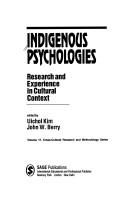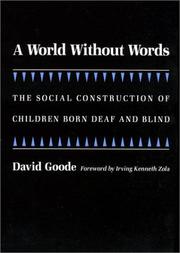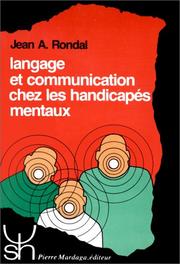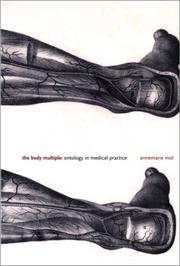| Listing 1 - 10 of 16 | << page >> |
Sort by
|
Multi
ISBN: 3861303256 Year: 2003
Abstract | Keywords | Export | Availability | Bookmark
 Loading...
Loading...Choose an application
- Reference Manager
- EndNote
- RefWorks (Direct export to RefWorks)
#SBIB:39A9 --- Medische antropologie / gezondheid / handicaps
Book
ISBN: 9242545422 9789242545425 Year: 2001 Publisher: Genève : OMS [Organisation Mondiale de la Santé] = WHO [World Health Organization],
Abstract | Keywords | Export | Availability | Bookmark
 Loading...
Loading...Choose an application
- Reference Manager
- EndNote
- RefWorks (Direct export to RefWorks)
Développement humain --- Gezondheid --- Health --- Human development --- Menselijke ontwikkeling --- Personal health --- Santé --- Wellness --- People with disabilities --- Handicapés --- Functional assessment --- Evaluation fonctionnelle --- Classification internationale des déficiences, incapacités et handicaps. --- Handicapes --- Medische classificaties/Nomenclaturen --- Pathologie --- Gehandicapten --- Geestelijke gezondheidszorg --- Classifications médicales/Nomenclatures --- Soins de santé mentale --- Handicapés --- Classification internationale des déficiences, incapacités et handicaps. --- Handicapes - Evaluation fonctionnelle --- Disabled Persons --- classification
Book
ISBN: 2804117448 9782804117443 Year: 1993 Volume: vol *1 Publisher: Bruxelles : De Boeck Université,
Abstract | Keywords | Export | Availability | Bookmark
 Loading...
Loading...Choose an application
- Reference Manager
- EndNote
- RefWorks (Direct export to RefWorks)
Peut-on évaluer et rééduquer la vision ? Oui, affirme cet ouvrage fondé sur une longue pratique clinique commune de rééducation, de suivi et de guidance auprès de nombreux malades souffrant de troubles visuels d'origine cérébrale. L'ouvrage expose la conquête de la perception de la lumière et du mouvement, de l'exploration du regard, de l'adaptation du geste à la vision, d'une meilleure autonomie dans l'espace, de la maîtrise de la lecture. C'est un itinéraire qui est proposé aux professionnels concernés par la neuropsychologie, en même temps qu'une description sémiologique des troubles à leurs différents stades.
Behavioral neurology --- Clinical neuropsychology --- Defective vision --- Disorders of vision --- Gezichtsstoornissen --- Handicaps [Visuele ] --- Impaired vision --- Klinische neuropsychologie --- Neurologie --- Neurology [Behavioral ] --- Neuropsychologie clinique --- Oogheelkunde --- Ophtalmologie --- Stoornissen [Gezichts] --- Therapieën --- Thérapies --- Troubles de la vision --- Vision disorders --- Vision--Anomalies --- Vision--Troubles --- Visual function disorders --- Visual handicaps --- Visual impairments --- Visuele beperkingen --- Visuele handicaps --- Zien--Stoornissen --- Neuropsychology --- Neuropsychologie visuelle --- --Enfant --- --Pathologie --- --Développement --- --Neuropsychology --- neuropsychologie --- visuele waarneming --- visuele reëducatie --- semiologie --- Visual disorders --- Communicative disorders --- Disabilities --- Eye --- Sensory disorders --- Neurophysiology --- Psychophysiology --- Diseases --- --Behavioral neurology --- --Clinical neuropsychology --- Visually handicapped --- Rehabilitation --- Visual perception --- Testing --- Enfant --- Pathologie --- Développement
Book
ISBN: 2701303338 9782701303338 Year: 1979 Publisher: Paris Berger-Levrault
Abstract | Keywords | Export | Availability | Bookmark
 Loading...
Loading...Choose an application
- Reference Manager
- EndNote
- RefWorks (Direct export to RefWorks)
Ethnology. Cultural anthropology --- Body, Human --- #SBIB:39A9 --- #SBIB:316.7C121 --- Human body. --- Human beings --- Body image --- Human anatomy --- Human physiology --- Mind and body --- Medische antropologie / gezondheid / handicaps --- Cultuursociologie: gedragspatronen, levensstijl --- Human body

Abstract | Keywords | Export | Availability | Bookmark
 Loading...
Loading...Choose an application
- Reference Manager
- EndNote
- RefWorks (Direct export to RefWorks)
#SBIB:39A9 --- Ethnopsychology --- Cross-cultural psychology --- Ethnic groups --- Ethnic psychology --- Folk-psychology --- Indigenous peoples --- National psychology --- Psychological anthropology --- Psychology, Cross-cultural --- Psychology, Ethnic --- Psychology, National --- Psychology, Racial --- Race psychology --- Psychology --- National characteristics --- Medische antropologie / gezondheid / handicaps --- Ethnopsychology.
Book
ISBN: 9789033469237 Year: 2008 Publisher: Leuven Acco
Abstract | Keywords | Export | Availability | Bookmark
 Loading...
Loading...Choose an application
- Reference Manager
- EndNote
- RefWorks (Direct export to RefWorks)
Psychiatrische diagnoses als depressie, schizofrenie, borderline, anorexia... lijken vanzelfsprekende concepten in ons alledaagse taalgebruik. Dagelijks worden we via tv, krant, radio, muziek, films, gesprekken op het werk of op straat geconfronteerd met diagnostische termen. Ondanks de bewering dat de DSM geen mensen, maar enkel stoornissen classificeert, is het in de dagelijkse praktijk altijd zo dat een diagnose wordt toegekend aan iemand, aan een 'ik' van vlees en bloed. In dit boek gaat de auteur na hoe die iemand, dat 'ik', kan omgaan met een diagnose die op haar/hem van toepassing wordt verklaard. Door in te gaan op vragen als 'Wat is een psychiatrische diagnose?', 'Wie is dat subject, dat "ik" dat gediagnosticeerd wordt?' en 'Hoe interageert een subject met een aan haar/hem toegekende psychiatrische diagnose?' stelt zij de dominante objectivistisch-reductionistische manier van 'kijken' naar de gediagnosticeerde mens in vraag. De gediagnosticeerde mens is niet één maar velen en kan niet gevat worden in één diagnose. Om dit duidelijk te maken, maakt zij gebruik van de metafoor van het rizoom. Door het subject/zelf op te vatten als een rizomatisch verhaal, biedt zij een vernieuwende en alternatieve kijk om het gediagnosticeerde subject in al zijn facetten te beschouwen
Psychiatrie. --- Psychiatrische patiënten. --- Psychotherapie --- Diagnostiek. --- psychodiagnostiek --- Psychiatry --- psychiatrie --- Mental illness --- Diagnosis --- Mentally ill --- Psychiatrie --- Diagnose --- Aanvaarding --- Verwerking --- Psychiatrische patiënten --- Diagnostiek --- #SBIB:316.334.3M20 --- #SBIB:39A9 --- #KVHB:Psychiatrie --- 616.89 --- Patiënten --- psychiatrische patiënten --- Psychische stoornissen --- Sociale epidemiologie en etiologie: sociale aspecten van ziekte en gezondheid --- Medische antropologie / gezondheid / handicaps --- 616.5 --- Provincie West-Vlaanderen --- Verwerking (trauma) --- Psychiatrische patiënt --- diagnostiek (geneeskunde) --- psychotherapie

ISBN: 1566392160 1566392152 9781566392150 9781566392167 1439905797 Year: 1994 Publisher: Philadelphia Temple University Press
Abstract | Keywords | Export | Availability | Bookmark
 Loading...
Loading...Choose an application
- Reference Manager
- EndNote
- RefWorks (Direct export to RefWorks)
Deafblind children --- Rubella in pregnancy --- Complications --- #SBIB:39A9 --- #SBIB:39A73 --- Virus diseases in pregnancy --- Blind-deaf children --- Children with disabilities --- Deafblind people --- Medische antropologie / gezondheid / handicaps --- Etnografie: Afrika --- Case studies --- United States --- Deafblind children - United States - Case studies. --- Rubella in pregnancy - Complications - United States - Case studies.
Book
ISBN: 222700505X Year: 1984 Publisher: Paris : Editions du Centurion,
Abstract | Keywords | Export | Availability | Bookmark
 Loading...
Loading...Choose an application
- Reference Manager
- EndNote
- RefWorks (Direct export to RefWorks)
Children --- Child psychopathology --- Child psychiatry --- Enfants --- Intelligence testing --- Tests d'intelligence --- Psychopathologie --- Psychiatrie --- Developmental Disabilities. --- COGNITION DISORDERS, in infancy and childhood --- CHILD DEVELOPMENT DISORDERS --- CHILD DEVELOPMENT DISORDERS. --- COGNITION DISORDERS, in infancy and childhood. --- Child development disorders. --- Cognition disorders, in infancy and childhood. --- Fysieke handicaps. --- Orthopedagogiek --- Child psychopathology. --- Child psychiatry. --- Developmental Disabilities

ISBN: 2870092253 9782870092255 Year: 1985 Volume: 149 Publisher: Bruxelles : Pierre Mardaga,
Abstract | Keywords | Export | Availability | Bookmark
 Loading...
Loading...Choose an application
- Reference Manager
- EndNote
- RefWorks (Direct export to RefWorks)
Language acquisition --- People with mental disabilities --- -People with mental disabilities --- -Psycholinguistics --- Children with mental disabilities --- -Mentally handicapped children --- Mentally retarded children --- Retarded children --- Children with disabilities --- Youth with mental disabilities --- Language, Psychology of --- Language and languages --- Psychology of language --- Speech --- Linguistics --- Psychology --- Thought and thinking --- Intellectually disabled persons --- Mental disabilities, People with --- Mentally deficient persons --- Mentally disabled persons --- Mentally disordered persons --- Mentally handicapped --- Mentally retarded persons --- People with intellectual disabilities --- Retarded persons --- People with disabilities --- Mental retardation --- Mentally ill --- Acquisition of language --- Developmental linguistics --- Developmental psycholinguistics --- Language development in children --- Psycholinguistics, Developmental --- Interpersonal communication in children --- Psycholinguistics --- Language --- Means of communication --- Psychological aspects --- Acquisition --- -Mentally handicapped --- Means of communication. --- Means of communication for people with mental disabilities --- Communication --- Mentally handicapped children --- -Language acquisition --- Language acquisition. --- Psycholinguistics. --- Language. --- Orthopedagogiek --- fysieke handicaps. --- Kinderen (Geestelijk gehendicapte). Communicatie. --- Enfants déficients mentaux. Langage. --- Enfants déficients mentaux. Communication. --- Kinderen (Geestelijk gehandicapte). Taal. --- Fysieke handicaps. --- Communication orale --- Handicapés mentaux --- Mentally handicapped children - - Language --- Mentally handicapped - - Means of communication

ISBN: 0822329174 9780822329176 0822329026 Year: 2002 Publisher: Durham, N.C. Duke University Press
Abstract | Keywords | Export | Availability | Bookmark
 Loading...
Loading...Choose an application
- Reference Manager
- EndNote
- RefWorks (Direct export to RefWorks)
Atherosclerosis --- Social medicine. --- Medical anthropology. --- Ontology. --- Medicine --- Ethnographic informants --- Philosophy. --- Athérosclérose --- Informateurs (Ethnologie) --- Organisatie van de gezondheidszorg: modellen van therapeutisch handelen --- Athérosclérose --- #SBIB:39A9 --- #SBIB:39A72 --- #SBIB:316.334.3M51 --- Medische antropologie / gezondheid / handicaps --- Etnografie: Europa --- Médecine sociale --- Anthropologie médicale --- Ontologie --- Médecine --- Philosophie --- Atherosclerosis - Netherlands. --- Medicine - Philosophy. --- Ethnographic informants - Netherlands. --- Metaphysics --- Philosophical anthropology --- Social medicine --- Sociology of health --- Human medicine
| Listing 1 - 10 of 16 | << page >> |
Sort by
|

 Search
Search Feedback
Feedback About UniCat
About UniCat  Help
Help News
News